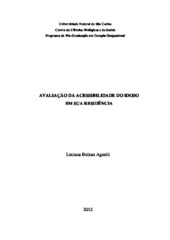Avaliação da acessibilidade do idoso em sua residência
Resumen
Abstract: The expressive elderly population growth in Brazil, due to multiple factors, has created needs in several social dimensions. The challenge is to live longer with an increasing quality of life. The limitations commonly imposed by the advanced age affects the environment where the elderly people is inserted, specially their house, which must be accessible, favoring the functionality and to preventing accidents. The objective of this study was to assess the residence spatial conditions of elderly people aged between 60 and 69 years, in order to verify which conditions are favorable and which are unfavorable for residence accessibility and elderly people s satisfaction in relation to the home environment. A total of 20 active and independent individuals participated in the research, and they were selected by Functional Independence Measure (FIM). The data were collected in the individuals residence, through an interview about the house and an environmental assessment inspection, developed from Standard 9050 (Brazilian Association of Technical Standards ABNT). The research revealed a circulation area narrower than 60 cm in 80% of the visited residences; floor irregularities (10%); unevenness on the ground, particularly in the backyard (75%); obstacles in general, such as carpets (100%) and vases (40%). The existence of facilitators was noted, such as supporting bars for bathrooms (25%), lamp close to bed (35%), and others. There is a history of fall in the current residence in 45% of the cases, mostly by causes related to environmental factors. The home environment, as any other, has elements that work as obstacles and others that work as facilitators. The elderly people of this research showed knowledge in relation to the theme and showed acknowledge about the environment risks and the benefits of some adaptations. It was possible to affirm that assistive technology must be implemented not only as a compensatory element of some functions, but to assure the maintenance of independence, with security, in a preventive perspective.
